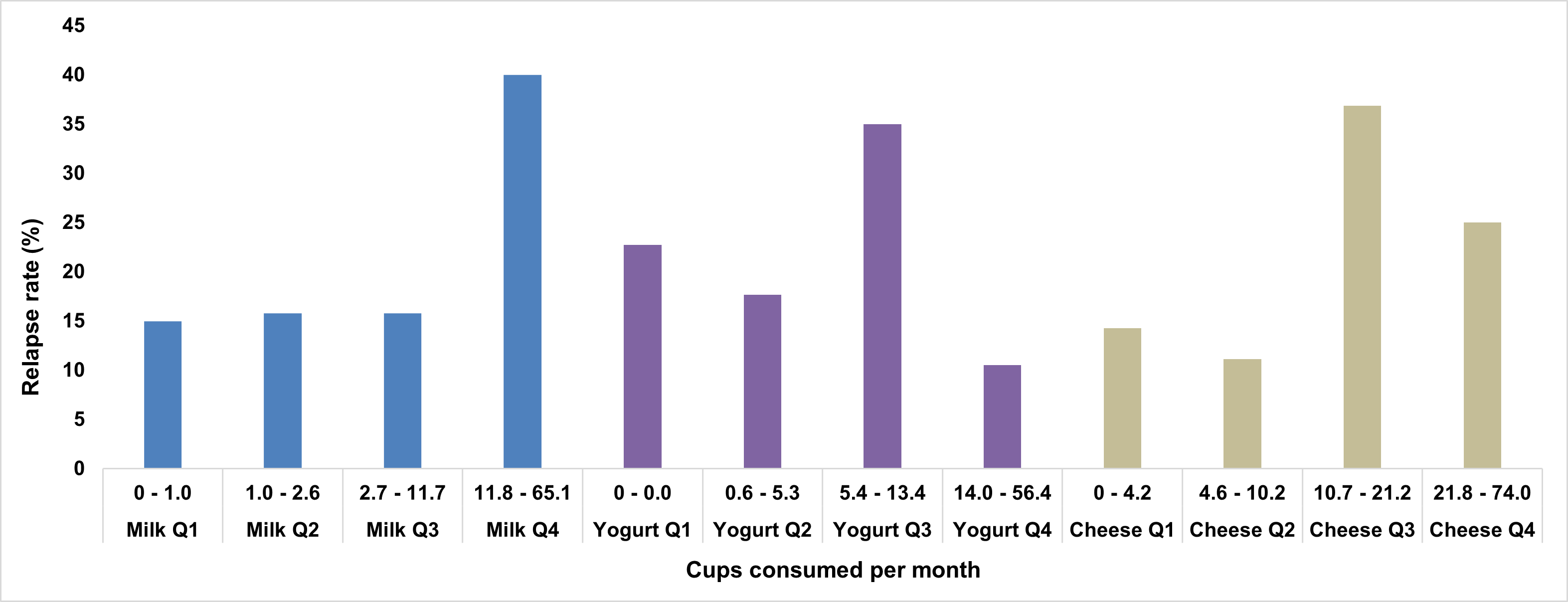Monday Poster Session
Category: IBD
P3330 - Effect of Dairy Intake on Clinical Relapse in Patients With Inflammatory Bowel Disease
Monday, October 27, 2025
10:30 AM - 4:00 PM PDT
Location: Exhibit Hall

Brendan Field
David Geffen School of Medicine at UCLA
Los Angeles, CA
Presenting Author(s)
Brendan Field, , Angela Minasyan, BS, Jia Hui Hai, , Jaden Nguyen, , Sureya Hussani, MD, Christina Fasulo, MS, RD, Berkeley Limketkai, MD, PhD
David Geffen School of Medicine at UCLA, Los Angeles, CA
Introduction: Dairy products are often avoided by patients with inflammatory bowel disease (IBD) due to concerns of triggering gastrointestinal symptoms and aggravating disease activity. However, existing data are unclear, showing both benefit and detriment of dairy consumption on gut inflammation. This study aims to evaluate the association between dairy intake and risk of relapse in patients with IBD.
Methods: This retrospective study included adults with IBD who were seen at a tertiary-care academic center between 2019 and 2025. Patients with IBD in clinical and biochemical remission (normal fecal calprotectin) at baseline who completed a validated diet survey were included. Baseline intake of milk, yogurt, and cheese were each quantified in cups per month and divided into quartiles. The outcome was one-year relapse (development of gastrointestinal symptoms and calprotectin >150 µg/g stool). Multivariable logistic regression evaluated these associations, while adjusting for potential confounders.
Results: Of 78 patients in the study, 52.6% had Crohn’s disease and 47.4% had ulcerative colitis. The mean age was 36.0 (standard deviation 14.6) years, 52.6% were female, and 74.4% were white. A majority (73.1%) were on biologic therapy at baseline. The overall one-year risk of relapse was 22.0%. For milk intake, the risk of relapse hovered around 15% at the lowest three quartiles of intake (0-11.7 cups/month) but rose to 40% at the highest quartile (11.8-65.1 cups/month) (Figure). In multivariable models, the highest quartile of milk intake was significantly associated with relapse (adjusted odds ratio 4.2; 95% CI 1.1-16.3; p< 0.04). Yogurt and cheese intake were not associated with risk of relapse. Biologic therapy was protective against relapse in all models (p≤0.01 for all).
Discussion: High milk intake was associated with a four-fold increase in the odds of relapse among patients with IBD. This relationship appeared non-linear, with no elevated risk observed in the lower quartiles of intake, suggesting a potential threshold effect rather than a dose-gradient response. No significant association was found between relapse and the consumption of yogurt or cheese. Overall, these findings suggest that dairy product consumption in moderation does not increase risk of relapse for patients with IBD. Research to elucidate the underlying mechanisms for variability in symptom responses and potential microbiome-mediated pathways would help refine recommendations on dairy consumption for patients with IBD.

Figure: Relapse rates, stratified by quartiles of dairy consumption
Disclosures:
Brendan Field indicated no relevant financial relationships.
Angela Minasyan indicated no relevant financial relationships.
Jia Hui Hai indicated no relevant financial relationships.
Jaden Nguyen indicated no relevant financial relationships.
Sureya Hussani indicated no relevant financial relationships.
Christina Fasulo: Ironwood Pharmaceuticals – Consultant.
Berkeley Limketkai: Azora Therapeutics – Consultant, Stock-privately held company. Johnson & Johnson – Advisory Committee/Board Member, Speakers Bureau.
Brendan Field, , Angela Minasyan, BS, Jia Hui Hai, , Jaden Nguyen, , Sureya Hussani, MD, Christina Fasulo, MS, RD, Berkeley Limketkai, MD, PhD. P3330 - Effect of Dairy Intake on Clinical Relapse in Patients With Inflammatory Bowel Disease, ACG 2025 Annual Scientific Meeting Abstracts. Phoenix, AZ: American College of Gastroenterology.
David Geffen School of Medicine at UCLA, Los Angeles, CA
Introduction: Dairy products are often avoided by patients with inflammatory bowel disease (IBD) due to concerns of triggering gastrointestinal symptoms and aggravating disease activity. However, existing data are unclear, showing both benefit and detriment of dairy consumption on gut inflammation. This study aims to evaluate the association between dairy intake and risk of relapse in patients with IBD.
Methods: This retrospective study included adults with IBD who were seen at a tertiary-care academic center between 2019 and 2025. Patients with IBD in clinical and biochemical remission (normal fecal calprotectin) at baseline who completed a validated diet survey were included. Baseline intake of milk, yogurt, and cheese were each quantified in cups per month and divided into quartiles. The outcome was one-year relapse (development of gastrointestinal symptoms and calprotectin >150 µg/g stool). Multivariable logistic regression evaluated these associations, while adjusting for potential confounders.
Results: Of 78 patients in the study, 52.6% had Crohn’s disease and 47.4% had ulcerative colitis. The mean age was 36.0 (standard deviation 14.6) years, 52.6% were female, and 74.4% were white. A majority (73.1%) were on biologic therapy at baseline. The overall one-year risk of relapse was 22.0%. For milk intake, the risk of relapse hovered around 15% at the lowest three quartiles of intake (0-11.7 cups/month) but rose to 40% at the highest quartile (11.8-65.1 cups/month) (Figure). In multivariable models, the highest quartile of milk intake was significantly associated with relapse (adjusted odds ratio 4.2; 95% CI 1.1-16.3; p< 0.04). Yogurt and cheese intake were not associated with risk of relapse. Biologic therapy was protective against relapse in all models (p≤0.01 for all).
Discussion: High milk intake was associated with a four-fold increase in the odds of relapse among patients with IBD. This relationship appeared non-linear, with no elevated risk observed in the lower quartiles of intake, suggesting a potential threshold effect rather than a dose-gradient response. No significant association was found between relapse and the consumption of yogurt or cheese. Overall, these findings suggest that dairy product consumption in moderation does not increase risk of relapse for patients with IBD. Research to elucidate the underlying mechanisms for variability in symptom responses and potential microbiome-mediated pathways would help refine recommendations on dairy consumption for patients with IBD.

Figure: Relapse rates, stratified by quartiles of dairy consumption
Disclosures:
Brendan Field indicated no relevant financial relationships.
Angela Minasyan indicated no relevant financial relationships.
Jia Hui Hai indicated no relevant financial relationships.
Jaden Nguyen indicated no relevant financial relationships.
Sureya Hussani indicated no relevant financial relationships.
Christina Fasulo: Ironwood Pharmaceuticals – Consultant.
Berkeley Limketkai: Azora Therapeutics – Consultant, Stock-privately held company. Johnson & Johnson – Advisory Committee/Board Member, Speakers Bureau.
Brendan Field, , Angela Minasyan, BS, Jia Hui Hai, , Jaden Nguyen, , Sureya Hussani, MD, Christina Fasulo, MS, RD, Berkeley Limketkai, MD, PhD. P3330 - Effect of Dairy Intake on Clinical Relapse in Patients With Inflammatory Bowel Disease, ACG 2025 Annual Scientific Meeting Abstracts. Phoenix, AZ: American College of Gastroenterology.
